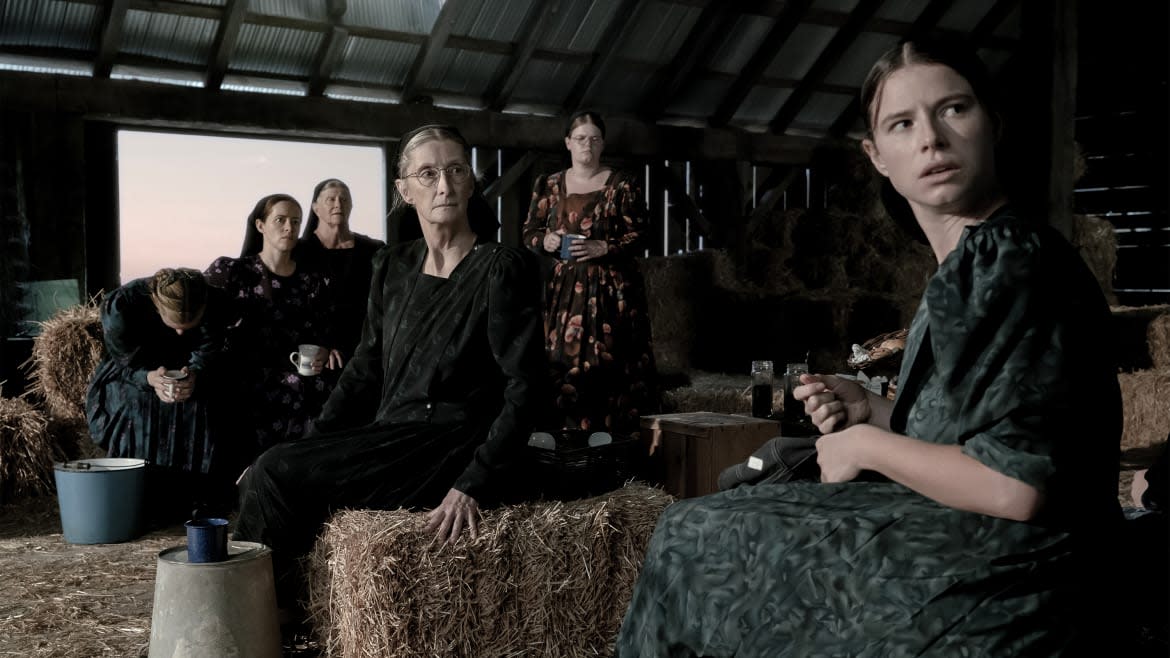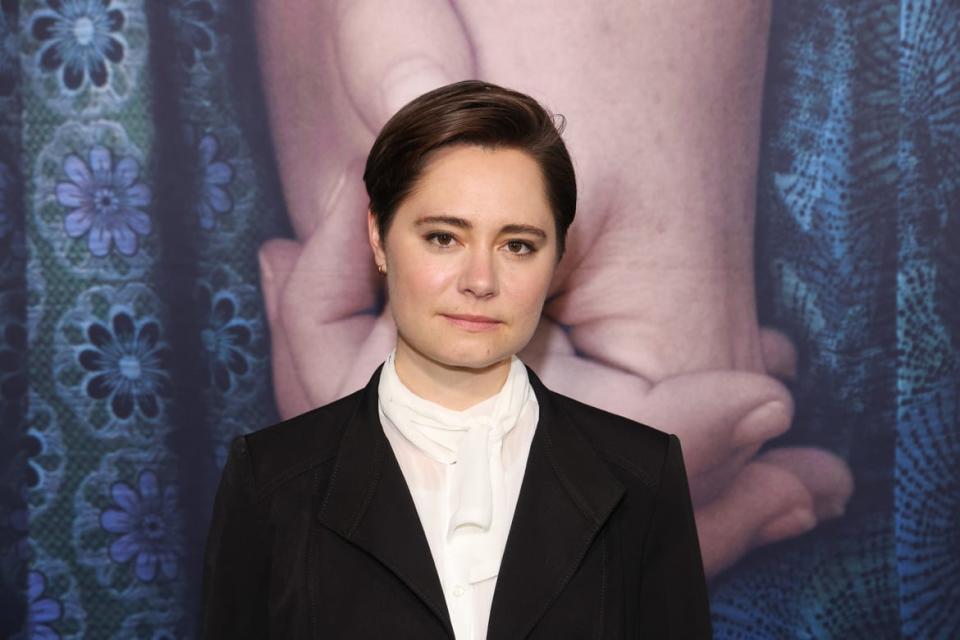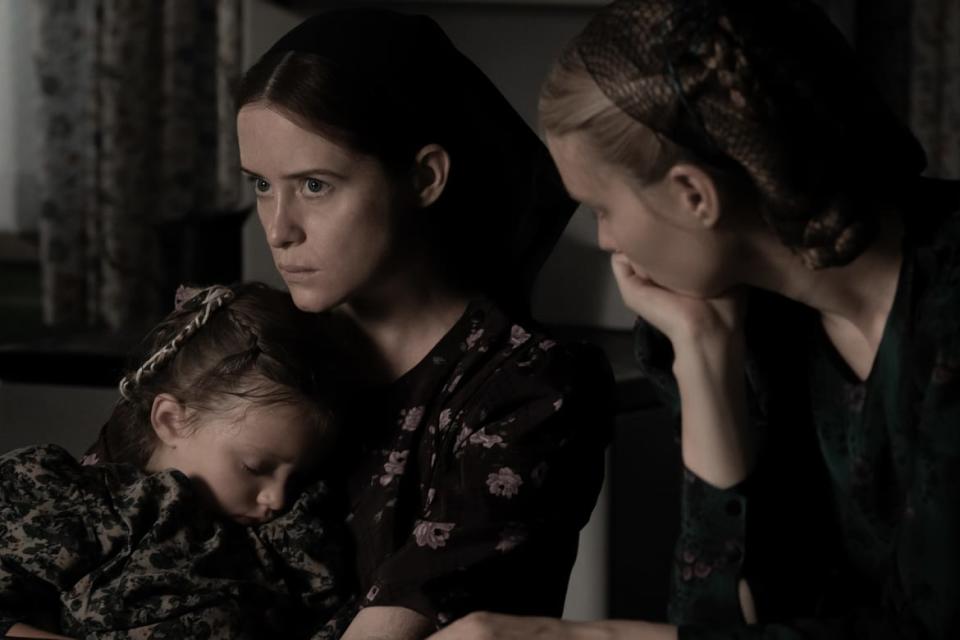‘Women Talking’ Squanders Its Chance to Tell a Great Trans Story

- Oops!Something went wrong.Please try again later.
- Oops!Something went wrong.Please try again later.
Women Talking, the latest film from Canadian director Sarah Polley, is a challenging story about a group of women debating how they should respond to devastating circumstances. For years, the women of a remote Mennonite community have been drugged and raped. When the women voiced their concerns that something horrifying was going on while they were slept, they were told merely that the devil was punishing them, or that it was simply in their heads. When one of the women awakes to discover her attacker in the middle of the night, the women discover that the men of the community are behind these atrocities.
As a community, the women decide that they have three options. They can do nothing, stay and fight, or leave the only home they’ve ever known. When no clear conclusion is reached, the women from two of the community’s most prominent families meet in secret, to decide how they should move forward from these mortifying circumstances.
‘Women Talking’ Is Toronto’s Buzziest, Most Devastating Film
The result is an oft-stunning meditation on the power of resistance. It has an exquisite score from Hildur Gudnadóttir (who won an Oscar for Joker), oscillating between heartbreak and hopefulness. The characters are really where Women Talking shines, from (male) transcriber August (Ben Whishaw), to the debating women themselves. The ferociously determined Salome (Claire Foy), prickly Mariche (Jessie Buckley), and serene, thoughtful Greta (Sheila McCarthy, the film’s MVP) are particular standouts.
But for all of the film’s merits, there was one character that frustrated me to no end and considerably detracted from Polley’s film: Melvin (August Winter). It’s not because Winter’s performance is bad—in fact, they do everything possible to give Melvin a real sense of interiority. Unfortunately, the issue lies within the film’s limiting script.
Melvin has undergone similar trauma to the other women, who have been drugged, raped, and assaulted by the men in their community. Melvin was likely assaulted by his own brother—though Melvin can never be sure, as he wasn’t conscious. The unbearable pain of his circumstances pushes Melvin to come out as trans. This is the one thing regarding this character the film does well. Women Talking makes it clear that Melvin is not trans because he was assaulted; rather, the assault made it no longer tenable for Melvin to stay closeted, forcing him to go public with his transition.

August Winter at the Los Angeles premiere of Women Talking on Nov. 17, 2022 in Beverly Hills, California.
Interestingly, Melvin spends most of his time with the children of the village. His trauma has led him to shun the adults, taking a vow of silence with everyone but the kids. It makes sense that he chooses not to speak to anyone else: When the women talk about Melvin, they refuse to validate his identity, constantly deadnaming him and deliberately using the wrong pronouns when talking about or even to him. The children of the village do not have the same issue, happily embracing Melvin for who he really is.
The Best Movies of 2022: From ‘Elvis’ to ‘Banshees of Inisherin’
But the screenplay seems to define Melvin’s existence entirely by his trauma. While Women Talking certainly about trauma and how process it, the women in the film are rich characters diverse in thought and opinion; they are more than what they’ve experienced. But Melvin is not offered that same courtesy, and the film makes no genuine effort to understand who he is.
So why have Melvin in the film at all? He is a character in Miriam Toews’ novel, upon which the film is based, but the wonderful thing about adaptation is the ability to tell the story on your own terms. The film does make other considerable shifts from Toews’ terrific novel. The book takes place almost exclusively in the barn where the women debate, but Polley’s film feels more expansive, giving us a fuller sense of the community these women live in.
The most significant change the film makes is switching the narrative perspective from August (as he is the one transcribing, and the only person involved who can read or write) to Autje (Kate Hallett), one of the youngest women in the discussions. It’s a bold move—Toews using August to narrate the women’s experiences is a powerful comment on the patriarchal society they’re beholden to—but it’s an effective one, as Autje provides insight that August simply cannot, and does not, have.
Including Melvin in this version of the story feels like an afterthought, stemming from a desire to remain faithful to the original text without considering what this character brings to the table. It feels like an attempt to be diverse at its very worst, shoehorning in a trans character for the sole purpose of being able to say that your film has a trans character. But Women Talking already features women of varying ages in ways that most Hollywood films wouldn’t dream of. It doesn’t need to keep a flattened Melvin for inclusivity’s sake.

Emily Mitchell stars as Miep, Claire Foy as Salome and Rooney Mara as Ona in director Sarah Polley’s film Women Talking.
While there are plenty of opportunities to explore Melvin’s existence and give him a fleshed-out humanity, the film only validates him when he does what the other women ask of him. This is despite their inability to accept him for his true self. It’s only at the film’s end, when Melvin appears in the barn to report that he has done exactly what they’ve asked of him, do they decide to recognize his existence as equal to theirs. Agata (Judith Ivey), complete with a warm, knowing smile, says “Thank you, Melvin,” acknowledging his chosen name for the first time. Melvin, visibly moved, responds, “Thank you for saying my name.” It’s supposed to be a proud, powerful moment, but despite Winter’s emotional performance, it fails to resonate. The women get to feel proud of themselves for evolving, but all Melvin winds up with is a brief, fleeting, belated moment of validation.
The 12 Best Animated Movies and Shows of 2022
On the surface, Melvin one of the most intriguing characters in the film. He’s chosen to live his life openly as a trans man in a patriarchal, misogynistic society. But his deep-seated trauma silences him for the majority of the story, robbing us of a chance to learn more from that perspective. It’s painful to see so much potential to thoughtfully explore a trans identity—in a major awards player, no less—thrown by the wayside.
I still loved so much of what Women Talking offers. I absolutely believe that Sarah Polley is one of the most talented and impressive directors currently living. All of her films—Away From Her, Take This Waltz, Stories We Tell—are tremendous. Women Talking is, in many ways, her most accomplished film to date. But by including a trans character like Melvin and offering zero insight or nuance to the character, while only validating his existence in a rushed, half-baked climax, feels unsatisfying at best and sinister at worst.
This has been a big year for telling queer stories of all kinds on big and small screens. Women Talking reminds us that movies still have a long way to go when it comes to offering trans lives thoughtful, honest representation.
Get the Daily Beast's biggest scoops and scandals delivered right to your inbox. Sign up now.
Stay informed and gain unlimited access to the Daily Beast's unmatched reporting. Subscribe now.

